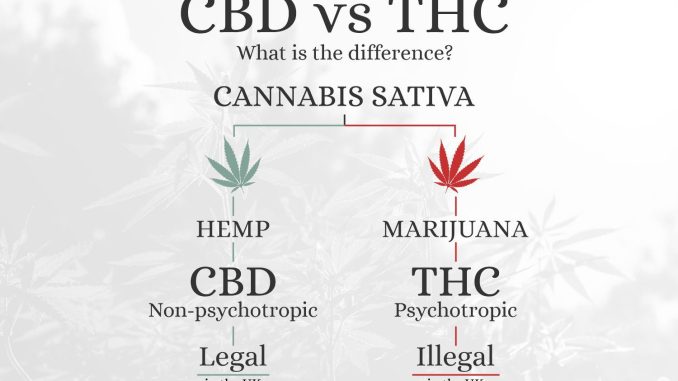
Cannabidiol (CBD) and tetrahydrocannabinol (THC) are two naturally occurring compounds found in cannabis plants. Although derived from the same source, CBD and THC have distinct differences in their effects, legality, and usage. This article aims to provide a comprehensive understanding of these differences and help readers make informed decisions.
What is CBD?
CBD is a non-psychoactive compound present in cannabis plants. It is typically extracted from hemp, a variety of cannabis with low levels of THC. CBD products have gained popularity due to their potential therapeutic effects, including pain relief, reduced anxiety, and anti-inflammatory properties. Unlike THC, CBD does not produce the characteristic “high” associated with cannabis use.
What is THC?
THC, on the other hand, is the primary psychoactive compound in cannabis responsible for the euphoric effects commonly associated with marijuana use. It binds to specific receptors in the brain, triggering a response that leads to altered perception, relaxation, and increased appetite. THC is classified as a controlled substance in many countries and its recreational use is prohibited in several places.
Legality and Regulations
The legal status of CBD and THC varies across countries and regions. In some parts of the world, CBD products are legal as long as they contain minimal levels of THC. This is the case in many European countries and numerous states in the United States. However, THC remains heavily regulated or outright illegal in many places due to its psychoactive properties.
It is important to note that laws regarding CBD and THC differ, so it is essential to understand the regulations in your particular jurisdiction before purchasing or consuming any cannabis-related products.
Medical Applications
CBD has garnered attention for its potential medical applications. It is commonly used to alleviate chronic pain, reduce seizures in certain epilepsy syndromes, and help manage symptoms of anxiety and depression. Additionally, ongoing research suggests CBD may have therapeutic benefits in treating various conditions, including neurodegenerative diseases and inflammation-related disorders.
THC, on the other hand, is primarily used for its recreational effects due to its psychoactive nature. However, THC-based medications are also prescribed in some countries to alleviate symptoms of pain, nausea, and muscle spasticity in specific medical conditions.
Safety and Side Effects
Both CBD and THC are considered generally safe substances when used appropriately. CBD is well-tolerated, with mild side effects such as drowsiness or dry mouth reported in some cases. THC, however, may cause short-term memory impairment, coordination issues, and increased heart rate. It can also provoke anxiety or paranoia, particularly in individuals sensitive to its effects.
It is crucial to note that the psychoactive properties of THC can impair cognitive and motor functions, making it unsuitable for certain activities such as driving or operating heavy machinery.
Conclusion
The differences between CBD and THC lie in their psychoactive properties, legality, and medical applications. While CBD offers potential therapeutic effects without intoxication, THC induces a euphoric “high” but may have medical benefits as well. Understanding these distinctions helps consumers make informed choices about cannabis products based on their individual needs and legal constraints.
